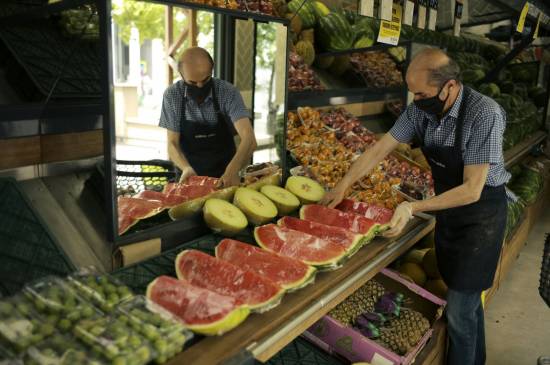Inflation figures for the month of May showed that the rise in consumer prices is on a downward trend, President Recep Tayyip Erdoğan said Sunday.
Turkey’s annual inflation rate rose at a lower-than-expected pace in May but still jumped to a 24-year high of 73.5%, fueled by soaring food and energy prices.
Speaking to members of his ruling Justice and Development Party (AK Party), Erdoğan said the government was working on ways to alleviate households’ economic woes and combat soaring prices.
“We never underestimate the problems experienced by our people in their daily lives. We are looking for ways to reduce the cost of living burden,” Erdoğan noted.
He reiterated that the government has been closely following the course of the prices and has put under the scope the exorbitant hikes.
Turkey’s consumer price index has surged since last autumn as the Turkish lira weakened after the central bank in September embarked on a 500 basis-point easing cycle.
Prices have been increasing despite tax cuts on basic goods and government subsidies for utility bills to ease the burden on household budgets.
The government says inflation will fall under its new economic program, which prioritizes low-interest rates to boost production and exports to achieve a current account surplus.
In a presentation to AK Party members on Saturday, Treasury and Finance Minister Nureddin Nebati said the fight against inflation is the top priority for the coming period.
Nebati stressed the importance of strengthening coordination and communication in the fight against rising prices, effective monetary policy, a prudent approach to public finances, as well as comprehensive and effective implementation of macroprudential policies.
The Central Bank of the Republic of Turkey (CBRT) revised its inflation forecasts for this year and next mainly because of the rise in commodity prices and supply issues.
A presentation by Governor Şahap Kavcıoğlu in April suggested inflation would peak around 70% before June before sliding to 42.8% by the end of the year.
The central bank has held its benchmark interest rate steady at 14% in five meetings this year and said disinflation will start due to other measures, the so-called base effect and an expected end to the Ukraine conflict.
Nebati also said that the leading indicators showed that the economy maintained its positive outlook in the second quarter of the year.
Strong demand, manufacturing and exports helped Turkey post better-than-expected 7.3% annual economic growth in the first quarter./agencies


